Dharma Artha Kama Moksha (4 Purusharthas) Information, Meaning | Concept and significance of Purushartha? | What are the four pillars of the Hindu religion? | What is meant by Purushartha? | What are the 4 aims (dharma) of life? | What are the four goals of human life explain each
Namaste friends, how are you doing today? Welcome to #BhagavanBhakthi website / blog.
Bhagavan Lord Sri Vishnu (Krishna, Rama, Trivikrama, Narasimha, Vamana, Vasudeva, Mukunda) and Goddess Lakshmi (Rukmini, Satyabhama, Sita, Kamala, Maya) blessings to you and your family!
In this website / blog, you will always learn about #Hinduism #Sanskrit language.
Also subscribe to my YouTube channel from this link #BhagavanBhakthi to view videos about #Hinduism #Sanskrit language.
Just before moving towards to know about “Dharma Artha Kama Moksha (4 Purusharthas) Information, Meaning | Concept and significance of Purushartha? | What are the four pillars of the Hindu religion? | What is meant by Purushartha? | What are the 4 aims (dharma) of life? | What are the four goals of human life explain each“, let us know few basic and important information.
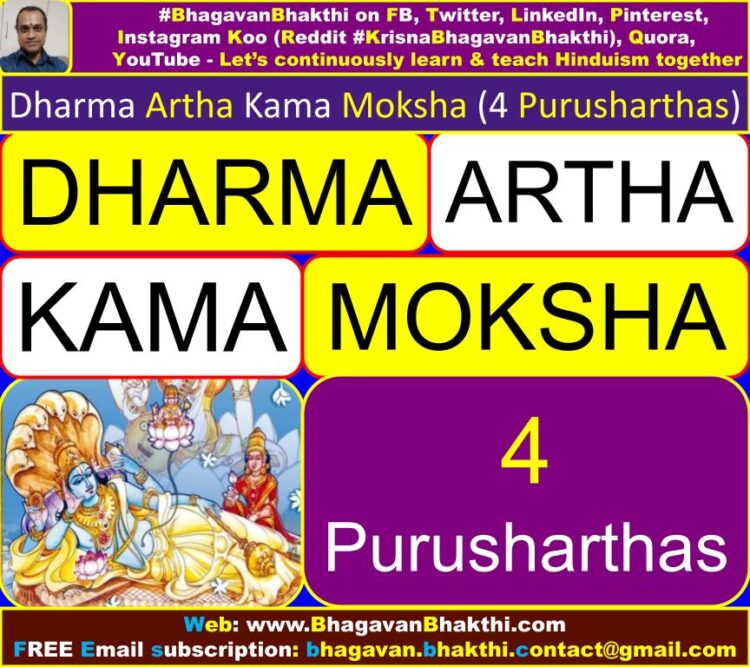
Dharma, Artha, Kama and Moksha are the four caturbhāva (Chaturbhavas) and they are known as Chaturvidha Purusharthas in Hinduism.
Here Chatur Bhava is one of the names of Bhagavan Lord Sri Vishnu as mentioned in Sri Vishnu Sahasranama (Sloka 82 – We will see the meaning below).
He is the reason for Dharma, Artha, Kama and Moksha. This means, Dharma = Doing duty as per the Sanatana Dharma. Artha = Ultimate divine wealth. Kama = Desire. Moksha = Divine liberation.
Chaturvidha Purusharthas means – Chaturvidha = Four + ways. Purusharthas = Human efforts (Many must have heard in olden days people asking, what is your Purusharthas?
This means, what efforts have you done to complete that particular job / work. Hinduism (Sanatana Dharma) is so unique and only one Dharma on this earth, that you can’t find another Dharma which is even close to Hinduism in any respect.
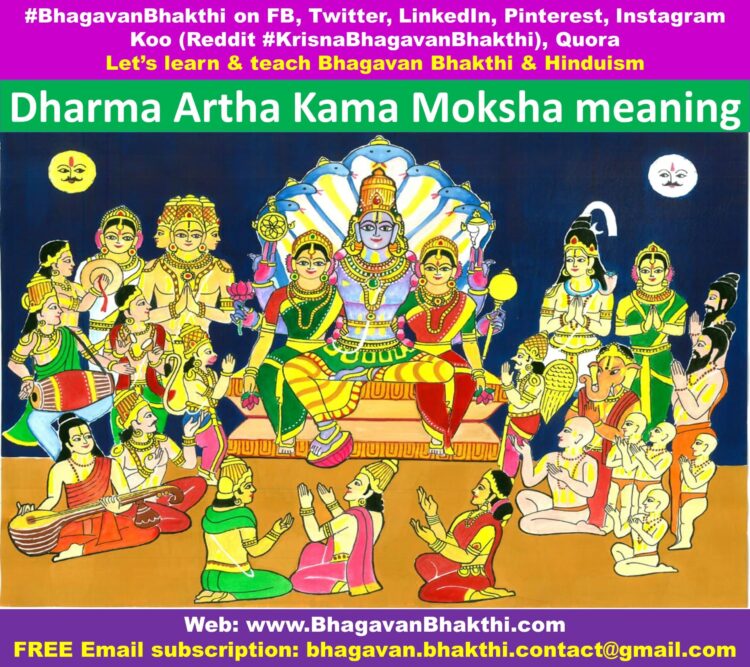
As said above, ‘caturbhāva’ (Chaturbhava) is one of the names and also the quality of Lord Sri Vishnu.
In Sri Vishnu Sahasranama Shloka 82 it is said that:
चतुर्मूर्ति श्चतुर्बाहु श्चतुर्व्यूह श्चतुर्गतिः ।
चतुरात्मा चतुर्भावश्चतुर्वेदविदेकपात् ॥ 82 ॥
ಚತುರ್ಮೂರ್ತಿ ಶ್ಚತುರ್ಬಾಹು ಶ್ಚತುರ್ವ್ಯೂಹ ಶ್ಚತುರ್ಗತಿಃ ।
ಚತುರಾತ್ಮಾ ಚತುರ್ಭಾವಶ್ಚತುರ್ವೇದವಿದೇಕಪಾತ್ ॥ 82 ॥
caturmūrti ścaturbāhu ścaturvyūha ścaturgatiḥ।
caturātmā caturbhāvaścaturvēdavidēkapāt॥ 82॥
Here caturbhāva means, Lord Sri Vishnu is the source of all the four, that is – Dharma, Artha, Kama and Moksha. Without Bhagavan Lord Sri Vishnu one can’t achieve these four Chaturbhavas.
Now, let us take these Chaturbhavas (Dharma, Artha, Kama and Moksha) one by one and understand the real meaning of all:
1. Dharma: Dharma is so called by that name, because it holds the truth. Dharma alone holds the people, righteousness, cosmic law, divine rules & regulations, reality, etc.
The word Dharma is derived from the root dhr̥ / Dhr, that is – to hold the people, righteousness, cosmic law, divine rules & regulations, reality, etc. and its etymological meaning is ‘that which all holds’ this universe and / or the people of the world, or the whole creation from the miniature to the macrocosm.
Dharma is the eternal Divine Law of Bhagavan Lord Sri Vishnu. The entire creation is held together and sustained by the All-powerful Law of Bhagavan Lord Sri Vishnu.
Thus, practice of Dharma, means recognition of this Law made by Lord Sri Vishnu and obeying by it. No language on this earth is as perfect as Sanskrit.
There is no proper and / or equivalent word in English or any other language for the Sanskrit term Dharma. It is very difficult to define Dharma in any other language.
In English, Dharma is generally defined as ‘righteousness’, ‘doing the duty in correct way’, ‘virtuous’, ‘law abiding’, ‘honest’, ‘faultless’, etc. Dharma is the epitome of righteousness. It is the principle of doing holy works. It is also the principle of unity of the universe.
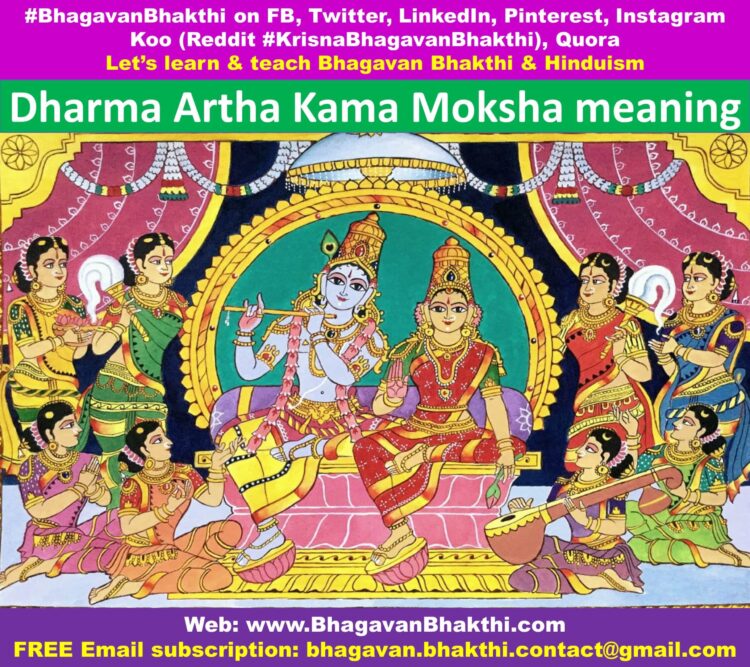
The great grand father of Hinduism, Bhishma says in his instructions to Yudhishthira that:
A. “Whatever creates conflict is Adharma, and whatever puts an end to that conflict and brings about unity and harmony is Dharma.”
B. “Anything that helps to unites all and develop pure divine love and universal brotherhood is Dharma. Anything that creates conflict, split and disagreement and foments hatred is Adharma.”
C. “Dharma is the cementer and sustainer of social life.” | D. “The rules of Dharma have been laid down for regulating the worldly affairs of humans”. | E. “Dharma brings as its consequence happiness, both in this world and in the next (Upper planets).”
F. “Dharma is the means of preserving one’s self. If you offence it, it will kill you. If you protect it, it will protect you. That’s why in Sanskrit there is a famous saying, “Dharmo Rakshati, Rakshitah”.
G. “Dharma is your sole companion after death. It is the sole refuge of mankind.”
Let us consider few shlokas from the most divine Srimad Bhagavad Gita which talks about Dharma:
परित्राणाय साधूनां विनाशाय च दुष्कृताम् |
धर्म–संस्थापनार्थाय संभवामि युगे युगे || 4.8 ||
ಪರಿತ್ರಾಣಾಯ ಸಾಧೂನಾಂ ವಿನಾಶಾಯ ಚ ದುಷ್ಕೃತಾಂ |
ಧರ್ಮಸಂಸ್ಥಾಪನಾರ್ಥಾಯ ಸಂಭವಾಮಿ ಯುಗೇ ಯುಗೇ || 4-8 ||
paritrāṇāya sādhūnāṁ vināśāya ca duṣkr̥tāṁ |
dharmasansthāpanārthāya sambhavāmi yugē yugē || 4-8 ||
Translation: For the protection of all the Lord Sri Vishnu devotees, for the annihilation / complete slaying of people who are against Dharma and to re-establish I (Lord Sri Vishnu) incarnate from time to time (again and again).
Here we should always keep in mind that, Lord Sri Krishna is telling that ‘Yuge Yuge’, this means, – from time to time (again and again) and not just every Yuga (Like Satya Yuga, Treta Yuga, Dwapara Yuga and Kali Yuga).
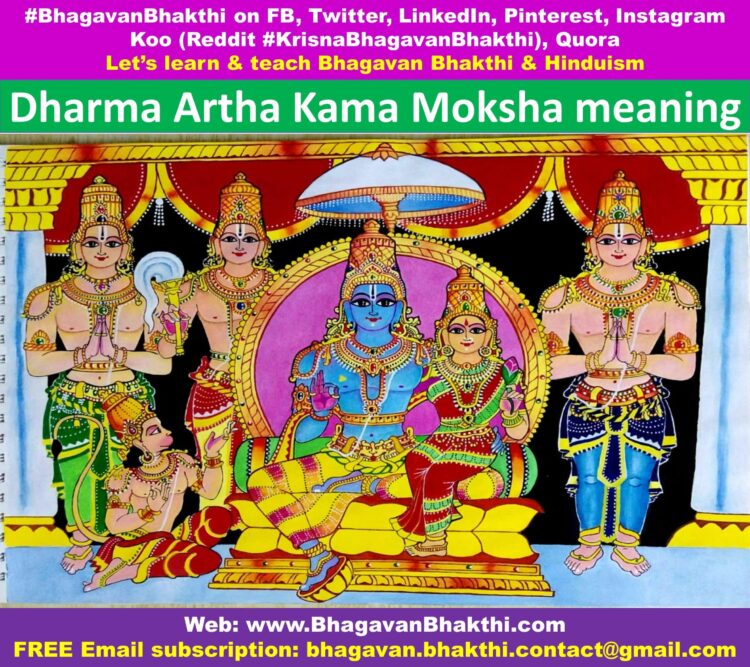
Another shloka from Srimad Bhagavad Gita:
यदा यदा हि धर्मस्य ग्लानिर्भवति भारत |
अभ्युत्थानमधर्मस्य तदात्मानं सृजाम्यहम् || 4-7 ||
ಯದಾ ಯದಾ ಹಿ ಧರ್ಮಸ್ಯ ಗ್ಲಾನಿರ್ಭವತಿ ಭಾರತ |
ಅಭ್ಯುತ್ಥಾನಮಧರ್ಮಸ್ಯ ತದಾತ್ಮಾನಂ ಸೃಜಾಮ್ಯಹಮ್ || 4-7 ||
yadā yadā hi dharmasya glānirbhavati bhārata |
abhyut’thānamadharmasya tadātmānaṁ sr̥jāmyaham || 4-7 ||
Translation: Whenever there is a decline in Dharma (Righteousness) and an augmentation in Adharma (unrighteousness), O Arjuna, at that time I (Bhagavan Lord Sri Krishna) will definitely manifest myself on this earth every time and again and again.
Another shloka from Srimad Bhagavad Gita:
कुलक्षये प्रणश्यन्ति कुलधर्माः सनातनाः ।
धर्मे नष्टे कुलं कृत्स्नमधर्मोஉभिभवत्युत ॥ 1-40 ॥
ಕುಲಕ್ಷಯೇ ಪ್ರಣಶ್ಯಂತಿ ಕುಲಧರ್ಮಾಃ ಸನಾತನಾಃ |
ಧರ್ಮೇ ನಷ್ಟೇ ಕುಲಂ ಕೃತ್ಸ್ನಮಧರ್ಮೋஉಭಿಭವತ್ಯುತ || 1-40 ||
kulakṣayē praṇaśyanti kuladharmāḥ sanātanāḥ |
dharmē naṣṭē kulaṁ kr̥tsnamadharmōubhibhavatyuta || 1-40 ||
Translation: When there is destruction of any dynasty, all its traditions get annihilated, and the rest of the family becomes involved in irreligious practices.
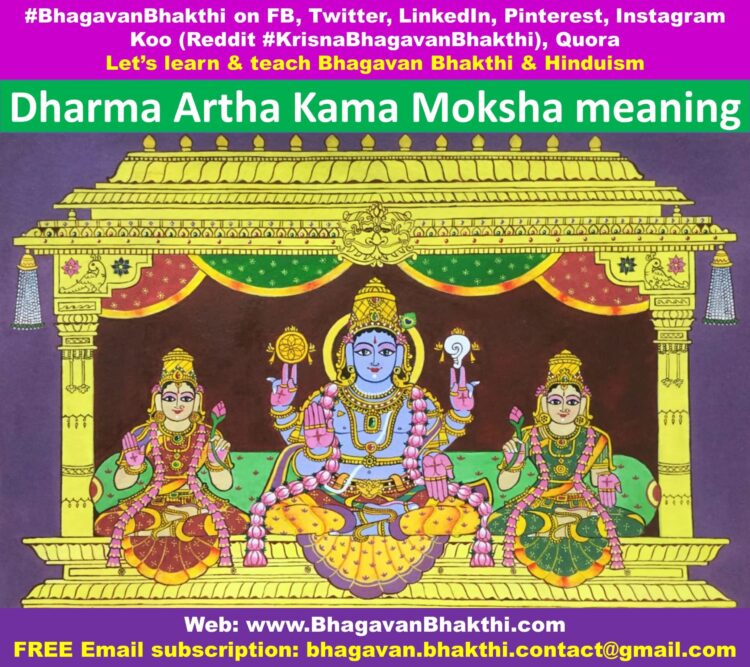
Another shloka from Srimad Bhagavad Gita:
सर्वधर्मान्परित्यज्य मामेकं शरणं व्रज ।
अहं त्वा सर्वपापेभ्यो मोक्षयिष्यामि मा शुचः ॥ 18-66 ॥
ಸರ್ವಧರ್ಮಾನ್ಪರಿತ್ಯಜ್ಯ ಮಾಮೇಕಂ ಶರಣಂ ವ್ರಜ |
ಅಹಂ ತ್ವಾ ಸರ್ವಪಾಪೇಭ್ಯೋ ಮೋಕ್ಷಯಿಷ್ಯಾಮಿ ಮಾ ಶುಚಃ || 18-66 ||
sarvadharmānparityajya māmēkaṁ śaraṇaṁ vraja |
ahaṁ tvā sarvapāpēbhyō mōkṣayiṣyāmi mā śucaḥ || 18-66 ||
Translation: Bhagavan Lord Sri Krishna is telling to Arjuna: Abandon all varieties of dharmas and just simply surrender unto me (Lord Sri Krishna) alone.
I (Bhagavan Sri Krishna) will definitely liberate you (Arjuna and we all others) from all unholy reactions, don’t be afraid.
From all the above Srimad Bhagavad Gita shlokas, it is very clear that Dharma has different meaning and one needs to have a long term association with Hindu granthas (Hindu divine books) to understand the correctness of the word Dharma.
To understand in simple words, whatever Lord Sri Krishna (Vishnu) tells is itself is Dharma. What he says is Dharma and what someone does against his words is ‘Adharma’.
Now, let us consider one shloka from Sri Vishnu Sahasranama:
धर्मगुब्धर्मकृद्धर्मी सदसत्क्षरमक्षरम्॥
अविज्ञाता सहस्त्रांशुर्विधाता कृतलक्षणः ॥ 51 ॥
ಧರ್ಮಗುಬ್ಧರ್ಮಕೃದ್ಧರ್ಮೀ ಸದಸತ್ಕ್ಷರಮಕ್ಷರಂ॥
ಅವಿಜ್ಞಾತಾ ಸಹಸ್ತ್ರಾಂಶುರ್ವಿಧಾತಾ ಕೃತಲಕ್ಷಣಃ ॥ 51 ॥
dharmagubdharmakr̥d’dharmī sadasatkṣaramakṣaraṁ॥
avijñātā sahastrānśurvidhātā kr̥talakṣaṇaḥ॥ 51॥
Translation (Only Dharma related translation is given): dharmagub : Lord Sri Vishnu is someone who protects Dharma; dharmakr̥d’ : Although Lord Sri Vishnu is unbounded by Dharma and adharma,
he performs only the dharma duties in order to protect the values of the traditions in respect of it; dharmī : Lord Sri Vishnu is the one who always upholds Dharma all time.

Another shloka from Sri Vishnu Sahasranama:
रामो विरामो विरजो मार्गोनेयो नयोऽनयः ।
वीरः शक्तिमतां श्रेष्ठो धर्मोधर्म विदुत्तमः ॥ 43 ॥
ರಾಮೋ ವಿರಾಮೋ ವಿರಜೋ ಮಾರ್ಗೋನೇಯೋ ನಯೋಽನಯಃ ।
ವೀರಃ ಶಕ್ತಿಮತಾಂ ಶ್ರೇಷ್ಠೋ ಧರ್ಮೋಧರ್ಮ ವಿದುತ್ತಮಃ ॥ 43 ॥
rāmō virāmō virajō mārgōnēyō nayō̕nayaḥ।
vīraḥ śaktimatāṁ śrēṣṭhō dharmōdharma viduttamaḥ॥ 43॥
Translation (Only Dharma related translation is given): dharmō : Lord Sri Vishnu he himself is Dharma and the one who bears all the Dharmas;
dharmavid : Lord Sri Vishnu is someone who knows the intricacies of all the Dharmas; uttamaḥ : Lord Sri Vishnu is the most Supreme off all.
Lord Sri Vishnu he himself is Dharma and the one who bears all the Dharmas and his very nature is doing only dharma works.
All his incarnations are for the purpose of Dharma itself. He is a symbol of Dharma and protector of Dharma. He is the best and greatest among the knower of all the Dharma.
Uses of practicing Dharma are as given below:
1. Among all the four main objects of human aspiration (Purusharthas), that is, Dharma, Artha, Kama and Moksha, Dharma is given the eminent and top most rank in the granthas (Hindu divine books).
2. Dharma alone is the gateway to Moksha (Divine liberation), infinite happiness, supreme peace, highest knowledge etc. 3. Also, Dharma alone is the principal Purushartha. Dharma is the grand first and most major Purushartha.
4. Through the practice of the divine Dharma alone, one can easily hope to achieve the crowning glory of all human endeavors, that is – the Moksha (Divine liberation) which is the best and the highest of all desirable things.
5. Practicing the divine Dharma on daily and regular basis, leads to the perfect realization of essential union or the final end, the top most goodness, that is, Moksha (Divine liberation).
6. Someone who practices the divine Dharma experiences divine peace, divine bliss, divine joy, divine auspiciousness, divine strength, divine tranquility within himself etc.
7. The person practicing Dharma becomes thoroughly disciplined. His / her powers and capacities are exceedingly intensified.
He / She realizes that there is one underlying homogeneous essence, a living truth, behind these names and forms.
6. The Dharma practitioner is transmuted into divinity. His / Her whole way of living gets divinely transformed. He / She becomes one with the Eternal bliss.
7. A man / woman who is involved in Dharma works, beholds Brahman (Lord Sri Vishnu) above, Brahman below,
Brahman to the right, Brahman to the left, Brahman in front, Brahman at the back, Brahman within, Brahman without, Brahman pervading the whole world etc.
Types of Dharma is as given below (Dharma can be classified under two groups as given below):
(a) Samanya or the general or universal Dharma : Forgiveness, contentment, self-control, self-discipline, non-stealing, purity, control of Indriyas (Senses), correct discrimination between right and wrong,
between the real and the unreal, spiritual knowledge, truthfulness and absence of anger come under the Samanya or general or universal Dharma.
(b) Vishesha or the specific or personal Dharma : Anything which relates to self comes under the Vishesha or the specific or personal Dharma.
The different characteristics of Dharma according to Manu Dharma assumes various kinds as given below:
a. Sanatana Dharma (Divine eternal Law), b. Samanya Dharma (General duty), c. Visesha Dharma (Special duty), d. Varnashrama Dharma (Duties of Caste and Order),
e. Svadharma (One’s own duty), f. Yuga Dharma (Duty of the Age), g. Kula Dharma (Duty of family), h. Manava Dharma (Duty of humans), i. Purusha Dharma (Duty of male),
j. Stri Dharma (Duty of female), k. Raja Dharma (Duty of king), l. Praja Dharma (Duty of subjects), m. Pravritti Dharma (Duty in worldly life) and n. Nivritti Dharma (Duty in spiritual life).
2. Artha – Lord Sri Vishnu is called as ‘arthōnarthō’ in Sri Vishnu Sahasranama. Lord Sri Vishnu himself is known as अर्थः / ಅರ್ಥಃ / arthah / ‘Arthah’ and also He is known as ‘Anarthah’ :-
“अर्थः / ಅರ್ಥಃ / arthah / Arthah” (This means ‘He is the Artha’ – Here He means Lord Sri Vishnu) generally gives a meaning of wealth which for few gives only materialistic explanation.
But the real meaning here in a supreme spiritual sense, ultimate wealth for a soul is Lord Sri Vishnu himself, which is eternal and permanent.
He is the ultimate wealth (Arthah) every soul would be longing to have doing different penances, austerities etc. Arthah also is known as ‘meaning’. Lord Sri Vishnu is the only real, ultimate meaning of everything in this unlimited universes.
Lord Sri Vishnu himself is the Arthah, that is, the giver of wealth and also paramārtha, that is, ultimate, superior wealth (Both materialistic and spiritual).
Lord Sri Vishnu is also अनर्थः / ಅನರ್ಥಃ / anarthah / Anarthah :- Literally the word Anarthah means harmful, disastrous, adverse effect, unfavorable, unpleasant, etc.
Yes indeed, Lord Sri Vishnu is अनर्थकारि / ಅನರ್ಥಕಾರಿ / anarthakāri / Anarthakari (pernicious) for those who exceed the limits of ‘Arthah’ that leads to negative passions (ArishadVargas)
and also for those who exceed the limits set by Him (Bhagavan Lord Sri Vishnu), that is, Cosmic or Universal Law as ordained by Him.
Another meaning that we can understand is, Anarthah is opposite of Arthah. Lord Sri Vishnu doesn’t need any material or spiritual wealth. He is free from both material and spiritual effects. He is called as Vashatkarah, that is,
Lord Sri Vishnu is the one who possesses qualities like:
A. All capabilities to do and undo anything and everything of anyone or anything; B. Thorough control over anything and everything (Including sovereignty, lordship etc.);
C. He is called as ‘Yashash’ (Can easily accomplish anything and everything); D. He knows all the material and spiritual knowledge in ample form;
E. He is completely dispassionateness (Non attachment); and F. He has bountiful riches, auspiciousness, prosperity, etc.
Bhagavan Lord Sri Vishnu is free from all imperfections.
Lord Sri Vishnu is the possessor of all auspiciousness, best and unlimited number of features, six of which are jnana (Knowledge), bala (Strength), aishvarya (Wealth), viirya (Heroism), shakti (Power), and tejas (Brilliance).
3. Kama: Lord Sri Vishnu is known as काम / ಕಾಮ / kāma / Kama. Lord Sri Vishnu in Sri Vishnu Sahasranama is called as:
भूतभव्यभवन्नाथः पवनः पावनोऽनलः ।
कामहा कामकृत्कान्तः कामः कामप्रदः प्रभुः ॥ 32 ॥
ಭೂತಭವ್ಯಭವನ್ನಾಥಃ ಪವನಃ ಪಾವನೋಽನಲಃ ।
ಕಾಮಹಾ ಕಾಮಕೃತ್ಕಾಂತಃ ಕಾಮಃ ಕಾಮಪ್ರದಃ ಪ್ರಭುಃ ॥ 32 ॥
bhūtabhavyabhavannāthaḥ pavanaḥ pāvanō̕nalaḥ।
kāmahā kāmakr̥tkāntaḥ kāmaḥ kāmapradaḥ prabhuḥ॥ 32॥
Here, kāmahā: Lord Sri Vishnu who destroys all desires (Material, wordly, etc.) | kāmakr̥t: Lord Sri Vishnu is the one who fulfills all desires of his devotees (Both material and spiritual). |
kāntaḥ: Lord Sri Vishnu who is of enchanting form. | kāmaḥ: Lord Sri Vishnu is the most beloved one. |
kāmapradaḥ: Lord Sri Vishnu is the one who supplies all the desired objects of his devotees. | prabhuḥ: Lord Sri Vishnu is such kind of Bhagavan (God) (One who fulfills all the above wishes of his devotees).
In another shloka of Sri Vishnu Sahasranama, Lord Sri Vishnu is known as:
कामदेवः कामपालः कामी कान्तः कृतागमः ।
अनिर्देश्यवपुर्विष्णुर्वीरोऽनन्तो धनञ्जयः ॥ 70 ॥
ಕಾಮದೇವಃ ಕಾಮಪಾಲಃ ಕಾಮೀ ಕಾಂತಃ ಕೃತಾಗಮಃ ।
ಅನಿರ್ದೇಶ್ಯವಪುರ್ವಿಷ್ಣುರ್ವೀರೋಽನಂತೋ ಧನಂಜಯಃ ॥ 70 ॥
kāmadēvaḥ kāmapālaḥ kāmī kāntaḥ kr̥tāgamaḥ।
anirdēśyavapurviṣṇurvīrō̕nantō dhanan̄jayaḥ॥ 70॥
kāmadēvaḥ: Lord Sri Vishnu is the the beloved Lord, viz, He is the one who is desired by devotees in quest of the four values of life that is, chaturvidha purusharthas – Dharma, Artha, Kama and Moksha.
kāmapālaḥ: Lord Sri Vishnu is the fulfiller of desires of his devotees, that is, he is someone who protects, safeguards, governs the legitimate desires of his devotees who totally surrender at His lotus feet.
kāmī: Lord Sri Vishnu is someone who has fulfilled all His desires, that is, he is the one who by nature has all his desires fulfilled. (His desires are not for material enjoyment or luxuries, He is Vashatkaara).
kāntaḥ: Lord Sri Vishnu is the one who is having the enchanting form. | kr̥tāgamaḥ: Lord Sri Vishnu is the author of the agama scriptures.
Out of the three PurushaArthas, that is, Dharma, Artha and Kama in Mahabharata Bhimasena says that Kama is most superior.
4. Moksha: “kami gani vadu moksha gami kadu”
Translation: A person who does not have desire at all, will never ever desire even for moksha.
Lord Sri Vishnu is called as Moksha and also the giver of Moksha.
In Sri Vishnu Sahasranama, Lord Sri Vishnu is known as:
पूतात्मा परमात्मा च मुक्तानां परमागतिः ।
अव्ययः पुरुषः साक्षी क्षेत्रज्ञोऽक्षर एव च ॥ 2 ॥
ಪೂತಾತ್ಮಾ ಪರಮಾತ್ಮಾ ಚ ಮುಕ್ತಾನಾಂ ಪರಮಾಗತಿಃ ।
ಅವ್ಯಯಃ ಪುರುಷಃ ಸಾಕ್ಷೀ ಕ್ಷೇತ್ರಜ್ಞೋಽಕ್ಷರ ಏವ ಚ ॥ 2 ॥
pūtātmā paramātmā ca muktānāṁ paramāgatiḥ।
avyayaḥ puruṣaḥ sākṣī kṣētrajñō̕kṣara ēva ca॥ 2॥
muktānāṁ paramāgatiḥ : Lord Sri Vishnu’s lotus feet and the Vaikuntha is the ultimate abode and most desired place where every divine atma / soul will be longing to go and stay eternally.
Here Mukta / Moksha means eternal stay in Vaikuntha.
Lord Sri Vishnu is only one who is called as मोक्ष प्रदात / ಮೋಕ್ಷ ಪ್ರದಾತ / mōkṣa pradāta (‘Moksha Pradata’), that is – Lord Sri Vishnu is the one who give the Moksha (Divine and ultimate libertation) to the deserving atmas / souls starting from:
Lord Sri Brahma Deva, Goddess Sri Sarasvati Devi, Lord Sri Rudra Deva (Lord Shiva), Goddess Sri Parvati Devi, Sri Indra Deva etc.
Lord Sri Vishnu is called as “Moksham Narayanaddhichhett“: Giving Moksha is the prerogative of Bhagavan Lord Sri Narayana / Vishnu. He is the one and the only one to grants Moksha (Divine liberation) to his deserved devotees.
Sri Vishnu Sahasranama is one of the most magnificent, meaningful stotram. Sri Vishnu Sahasranama an essence of all the four Vedas, it is a gift to the humanity carved out from Panchama Veda (Fifth Veda), that is, Mahabharata.
It is not just giving the names of the Sarvottama / Supreme Lord Sri Vishnu, but rather it indicates the qualities of Lord Sri Vishnu, that is of,
|| अनंत कल्याण गुण परिपूर्ण भगवान् || ಅನಂತ ಕಲ್ಯಾಣ ಗುಣ ಪರಿಪೂರ್ಣ ಭಗವಂತ || ananta kalyāṇa guṇa paripūrṇa bhagavan ||
Translation: Lord Sri Vishnu is the only who has all the complete infinite number of qualities, which non-other Devata / Demigod has.
We as ordinary humans is very hard to know just one of the one name of Lord Sri Vishnu, whereas Sri Madhwacharya Ji says hundreds of meaning could be interpreted for each name of Lord Sri Vishnu.
As per our granthas (Hindu divine books), Lord Sri Vishnu is the only source and from whom originated are, the four great human values, that is, Dharma, Artha, Kama and Moksha.
Lord Sri Vishnu is the Sarvottama / Supreme Dharma and ultimate Tattva and worshiping Him with proper अनुसंधान / ಅನುಸಂಧಾನ / anusandhāna / Anusandhana (As said in grantas / Hindu divine books) will yield his devotees full of both material and spiritual fruits.
More information will be added to this on regular basis. Please this post and other posts of this website / blog to get the updated information.
To watch videos on #Hinduism #Sanskrit language, SUBSCRIBE to my YouTube channel from this link: #BhagavanBhakthi YouTube channel
To know more about Bhagavad Gita, please visit this link: Bhagavad Gita on Bhagavan Bhakthi
To know more about Lord Sri Vishnu, kindly visit this link: Lord Sri Vishnu on Bhagavan Bhakthi
Dear friends, if you need any clarifications about this post, kindly let me know, I will definitely try to answer all of them.
Also your one LIKE, one COMMENT, One Share, one SUBSCRIPTION is highly important.
This will help to know the quality of this content and also it will be helpful to know if any improvements is required for the content.
If you feel this content is useful to you and has helped you to improve your knowledge, kindly share this with your well-wishers.
Because “SHARING MEANS CARING”.
To receive FREE EMAIL SUBSCRIPTION about #BhagavanBhakthi, you can send an email to bhagavan.bhakthi.contact@gmail.com from your email ID.
NAMASTE!
Sri Gurubhyo Namaha
Sri Krishnaaya Namaha
Sri Krishnaarpanamastu